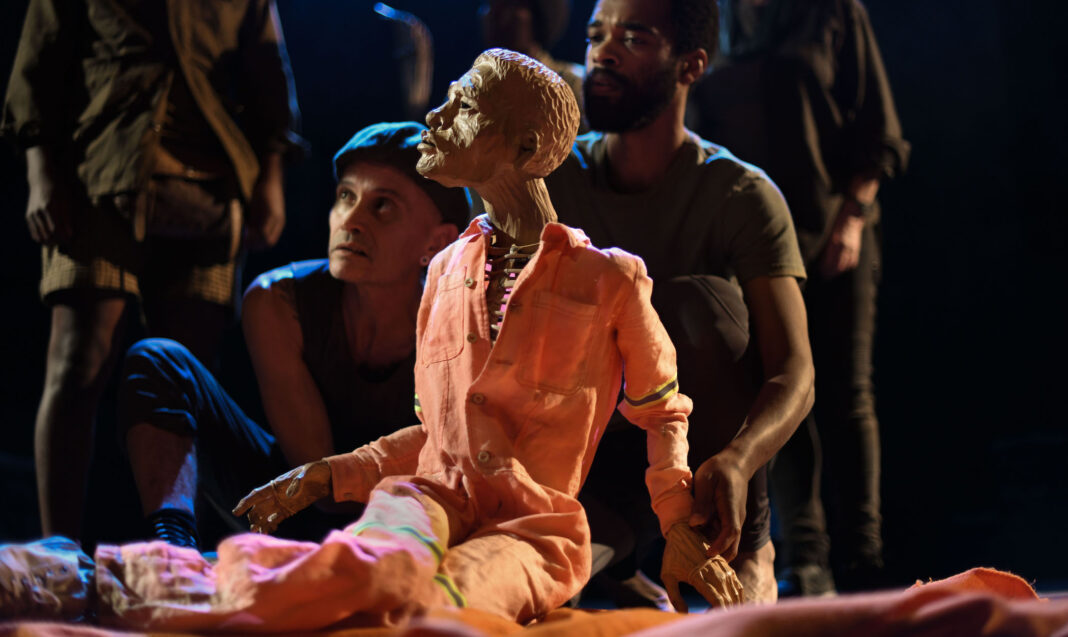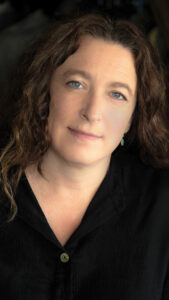
One of South African writer/director Lara Foot’s earliest memories of being creative is of staying up late after seeing a movie and rewriting the story in her mind to have a happier, or at least a better, ending. That instinct for storytelling at such a young age has no doubt served Foot well as she has had a remarkably successful career in the theater.
This week her adaptation of the Booker Prize-winning novel Life & Times of Michael K, written by JM Coetzee, opens at The Wallis in Beverly Hills on November 21st. She uses only the first half of Coetzee’s story of a young man’s journey through his war-torn country to return his mother to her home before she dies. Michael K must come to grips with his mother’s imminent passing and find a place for himself in this dystopian world.
Rather than a traditional play, Foot collaborated with Cape Town-based Handspring Puppet Company to create a different way of telling this story through puppets.
Foot is the head of Cape Town’s Baxter Theater. She has written multiple plays and directed even more. But Life & Times of Michael K is special to her. I learned this when speaking with her recently about the play, her instinct for storytelling and whether or not we can rewrite our own story to have a happier ending in our troubled times.
What follows are excerpts from our conversation that have been edited for length and clarity. To see the full interview, please go to our YouTube channel.
Q: I love the idea that as a young girl that you would stay up trying to rewrite a better or happier ending for the movies you saw and wouldn’t be satisfied until you figured out how to do so. That had to allow you develop a great storytelling skill. How does that way of thinking still live within you? Not just with the work that you do, but how you live your life?
I’m fascinated by biography and what you bring with you. What you bring as an actor to the stage, how you relate to other people, how you relate to family, are essentially biographies. Who you are. And when biographies meet, then drama happens. I would rewrite movies in my head from when I was probably 4 or 5. Frame by frame. Not only for happy endings, but also because sometimes I didn’t find them credible. So that is who I am. How we change, how we are affected by our context, our politics, all that might change your path – which fascinates me.
Which would make Life & Times of Michael K a perfect story for you, because the protagonist is trying to figure out his place in the world and how to change his story, isn’t he?
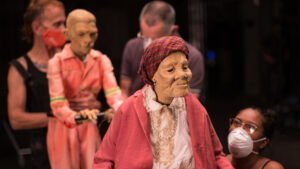
Yes. I mean, he goes on a journey through this dystopian war-torn country. He works his way through this country as a refugee, which, of course, resonates worldwide. And really trying to find his freedom or a semblance of freedom. So not having to live under somebody else’s rules on either side of the fence and find a little piece of land where you can live and grow vegetables. So this is searching for his purpose; the place we can live, finding his own freedom in this war-torn country.
When you read through the book, you must have been a little bit surprised when you came across a passage that says “Your past does not define your future. You have the power to rewrite your story.” It’s as if he tapped right into what you’ve been thinking since your youth?
I didn’t think of it in that way, but you’re absolutely right. When I started adapting it, it’s a thin book. It’s not even probably 200 pages, if that. I thought I’d do it quite quickly. I knew what I wanted to do with it. It took me so long because these layers of philosophy and so much can happen within sort of five or six lines. What to keep and what to let go of was really difficult because of the denseness of his thinking.
Coetzee wrote about his lead character in the book, “He did not seem to have a belief or did not seem to have a belief regarding help. Perhaps I am the stony ground, he thought.” How does a description like that inform how you go about adapting and creating this work and bringing this life to the stage?
That’s the magic of a puppet – especially a puppet carved by Adrian Kohler [of Handspring Puppet Company]. You can imbue a puppet with philosophy in a different way to say how an actor would have to deliver those lines on stage. It might be not that credible or self-conscious from an actor, but when it’s spoken through a puppet, the audience leans forward and starts to imagine and engage in these thoughts in a very different way. It’s almost like the landscape of Coetzee is etched into the puppet and he into the landscape.
What is the art of getting that total expression of a character through the combination of the puppets and the actors who bring that character to life?
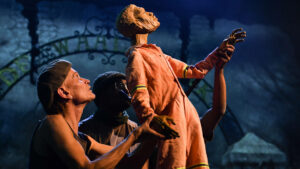
The most important thing is breath. So those three puppeteers on Michael K have to breathe pretty much at exactly the same time so that they work in unison. You know, I’m a theater director. I’m not a puppet director. Well, maybe I am now, but I wasn’t. I have puppeteers that are also very good actors and there’s a sense of imbuing the puppet with real feeling and character. So it takes some time.
That was a big challenge for me when I was directing it because a scene that could take me half an hour to create on stage with actors might take a full day to create with the puppet. So it’s very painstaking in terms of how detailed the movement is. Then the puppeteers understanding the body of the puppet like where do they hold weight and where do you hold feeling in your body. There’s a lot of synergy and working together, but always breath because a puppet is only alive when it’s breathing. Of course, it’s the puppeteers that breathe life into the puppet. As you let go of the puppet, it’s dead. It doesn’t live.
I read an interview that Coetzee gave in 1983 about Life & Times of Michael K. He said about his novel, “It didn’t turn out to be a book about becoming, which might have required that K have the ability to adapt more of what we usually call intelligence. But about being, which merely entailed that K go on being himself, despite everything.” It feels like there’s a good lesson to be learned in that basic approach.
It’s really about essence, you know, and how little one needs to survive. Really cutting through the greed and politics that’s out there. The darkness kind of leaning into the darkness as well, which Coetzee always does. But I think in our play it’s the way we hold the darkness that gives us a little glimmers of hope around humanity – although it’s hard to find these things.
In an interview that gave Sarafina Magazine in 2016 you said you “believe very much in storytelling as a means to healing, as a means to integration, and I suppose some sense of a healthy society in the future.” One could argue that the society that you grew up in and came out of certainly required healing. You could also argue that the society we live in now – and we’re having this conversation the day after the presidential election in the United States – that we’re maybe globally reaching some really unhealthy moments. What do you see as your main priority in a world on fire, to develop and present stories that can do precisely the healing you talked about?
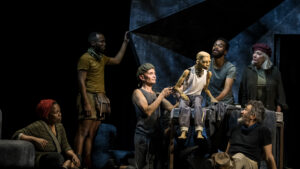
We go back to biography. I’m telling you stories. We had the Truth [and Reconcilliation] Commission [in South Africa] after democracy. It was an extraordinary thing. There’s some criticism of it. But the ability to come and tell your story and also to look into the eyes of your perpetrator, that’s empathy. That’s empathy from the storyteller. It’s one thing to say I will forgive, but, you know, you can’t really forgive. It’s not in your power to forgive and everything will go away. But you can have empathy.
I’ve talked with some academics about maybe finding a different voice for the future where we combine academic research with storytelling in a way. That we try and articulate things differently because we have so many academics doing research papers that might be on violence or crime, war or rape. Then we as artists to do plays about that. They’re frustrated that the world is not changing and we’re frustrated that the world is not changing. Maybe there’s another way to articulate what we feel.
Michael K cuts ties with the world. He doesn’t want to deal with what the world has become, particularly after the death of his mother. There are a lot of people who don’t want to deal with the world now. They don’t vote as in yesterday because the voting [numbers were] down considerably in this country or they don’t want to worry about it because it doesn’t affect them personally. Do you think there is an additional layer of topicality that this story is going to have now, particularly in the United States, that it might not have had the election gone a different way?
I would think so. When we started [the play] the war in Ukraine just started. That resonated when we came on the stage, especially internationally. And something else will resonate now, that’s for sure. Just in terms of our group, who’s telling the story, that’s going to be interesting, I think. This search for freedom…There’s slogans from the Democratic campaign that you hear in the play, not because we wrote them in. It’s just this search for freedom, although he doesn’t necessarily use the word freedom. It’s more a concept around freedom. Free from all the gatekeepers. Free from being a servant or being told what to do by somebody, anybody. [Michael K] was judged so badly when he was a child for having this hairlip that he has to find a freedom from that cruelty.
Given everything we are facing down as we near the start of 2025, how do you think we can collectively rewrite the plot of our lives right now and come up with a happier ending than it appears we’re facing as a possibility right now? Can an artist, can the arts, help us get there?
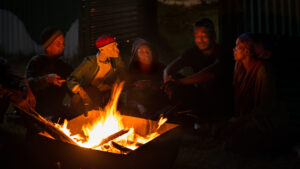
One has to pray to whoever you pray to for empathy. Only when you put yourself in someone else’s shoes can you feel the cruelty all round. Until people can see themselves in others. It’s a miracle what happened in South Africa, you know, absolute miracle. It wasn’t just Mandela. Somehow there was a bigger sensibility or a vision. Such an extraordinary vision of what hope looked like, of what the possibilities looked like. It wasn’t just verbalized. It wasn’t just a slogan, but put into practice. Thought through.
We’ve still got major issues with poverty. But there was a philosophy that everyone worked towards and it was about goodness. It wasn’t about the other. It wasn’t about division. It was about coming together.
When I first saw plays at the Market Theater when I was 17, I didn’t know what was going on in our country. I saw these plays and I was like, okay, I’m a part of it. I’m part of making something better. So I think that it does do that.
To watch the full interview with Lara Foot, please go here.
Life & Times of Michael K runs November 21st – November 24th at The Wallis. For tickets and more information, please go here.
Main Photo: Craig Leo and Carlo Daniels in Life & Times of Michael K (Courtesy The Wallis)











